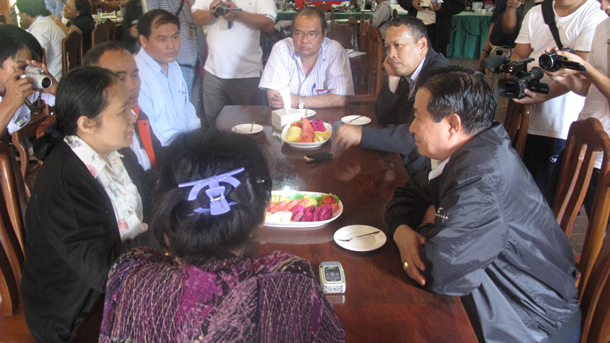MAE SOT — Naypyidaw’s key ceasefire negotiators Aung Min and Khin Yi met on Tuesday with the award-winning founder of Mae Tao Clinic, Dr. Cynthia Maung, at the Thai-Burmese border where they invited her to open hospitals inside Burma.
“We heard you treated more than 100,000 people from Burma every year,” Aung Min said to her at the meeting. “That’s even more than the government does.”
Speaking at Mae Sot’s Wattana Hotel, Aung Min, who also holds positions as Burma’s railways minister and vice-chairman of the Union Peace Making Working Committee, said, “I would like to invite you to come and open hospitals inside the country. In Burma, you could run a 5,000-bed hospital.”
Dr. Cynthia Maung did not respond directly to Aung Min’s comments, but told reporters shortly after the meeting that she would need to see more details and hold further talks with the government about any movement in her social and health work programs.
“If the heath care system in Burma was better, then poor people would not need to come to the border to get treatment,” she said.
Aung Min is scheduled to visit Dr. Cynthia’s Mae Tao Clinic on Wednesday morning. His offer of cooperation comes at a time when severe funding cuts threaten to disrupt some of the Mae Tao Clinic’s long-running programs.
It was Cynthia Maung’s first face-to-face meeting with government minsters since she fled Burma following the military crackdown on pro-democracy protests in 1988.
Aung Min, Khin Yi and their delegation—which included executive members of the Myanmar Egress Group—arrived in Thailand on Monday for talks with several border-based groups, including the Karen National Union (KNU), the All Burma Students’ Democratic Front (ABSDF) and the Forum for Democracy in Burma (FDB).
After an open meeting with Cynthia Maung, the government negotiators held private talks with three ABSDF leaders before meeting behind closed doors with KNU officials led by General-Secretary Zipporah Sein.
Myo Win of the ABSDF said that the one-hour meeting with Aung Min and Khin Yi was the first step to further talks between their group and the government side.
“We exchanged views on the current political process and national reconciliation, and had discussions on the specific details of further talks,” he said. “We raised some issues during the negotiations, but it is too early to tell the media what we spoke about.”
Tuesday’s meeting with a government delegation was the second round of talks for the ABSDF, also known as the Burmese student army, which was formed following the 1988 uprising when hundreds of students—many of them middle-school teenagers from Rangoon—took up arms to fight against the Burmese army.
The ABSDF had previously sat down with a government peace committee led by a leader of the ruling Union Solidarity and Development Party (USDP), Aung Thaung, who is a former minister of Industry-1.
On Monday, Aung Min’s entourage held talks with an exiled political party, the Democratic Party for a New Society (DPNS), in Bangkok.
DPNS spokesman Aung Moe Zaw told The Irrawaddy on Monday that there were two key topics during the two-hour meeting: legalizing the party by withdrawing its name from the list of outlawed organizations in Burma; and the process of repatriating exiled Burmese.
“U Aung Min told us he will try and confirm these two issues as soon as possible,” Aung Moe Zaw said. “This was a better meeting than the previous one.”
Speaking to reporters after the talks, Aung Min said, “Regarding meetings with the KNU, we would like to arrange talks for the first week of August—the process is ongoing and improving.
“As for the other groups, many are exiles in different ways,” he said. “Many are educated people who work for the benefit of their country.
“Now times are changing in Burma, and the system is changing too. Why are they suffering in exile? That’s why I came here—to bring them back home,” he said.
June is proving to be a busy month for government negotiator Aung Min and his aides. On June 20, they met in Maijayang, Kachin State, with the Kachin Independence Organization (KIO) led by Maj-Gen Sumlut Gen Maw.
In Maijayang, Aung Min promised his Kachin counterparts a withdrawal of government troops from frontlines in what the Kachin officials described as a “positive step.”
The government peace committee and the KIO are now in the process of scheduling another round of negotiations, during which Gen. Soe Win, the deputy commander-in-chief of the Burmese armed forces, is likely to attend.

















